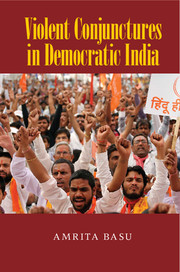Book contents
- Frontmatter
- Dedication
- Contents
- List of Figures and Tables
- Acknowledgments
- Glossary of Indian Words and Terms
- Indian Organizations, Institutions, and Political Parties
- Abbreviations of Political Parties and Organizations
- Introduction
- PART I THE PILLARS OF HINDU NATIONALISM
- PART II EXTENSIVE VIOLENCE
- PART III EPISODIC VIOLENCE
- 6 Uttar Pradesh: Movements and Countermovements
- 7 Himachal Pradesh: The Party Rules
- 8 Rajasthan: Two Phases of Party-Movement Relations
- 9 Conclusion
- Selected Bibliography
- Index
- Books in the Series (continued from page iii)
9 - Conclusion
from PART III - EPISODIC VIOLENCE
Published online by Cambridge University Press: 05 July 2015
- Frontmatter
- Dedication
- Contents
- List of Figures and Tables
- Acknowledgments
- Glossary of Indian Words and Terms
- Indian Organizations, Institutions, and Political Parties
- Abbreviations of Political Parties and Organizations
- Introduction
- PART I THE PILLARS OF HINDU NATIONALISM
- PART II EXTENSIVE VIOLENCE
- PART III EPISODIC VIOLENCE
- 6 Uttar Pradesh: Movements and Countermovements
- 7 Himachal Pradesh: The Party Rules
- 8 Rajasthan: Two Phases of Party-Movement Relations
- 9 Conclusion
- Selected Bibliography
- Index
- Books in the Series (continued from page iii)
Summary
Why did Hindu nationalists' destruction of the babri masjid in 1992 and the violence with which it was associated not mark a turning point in Hindu-Muslim relations and the BJP's fate? Contrary to Mulayam Singh Yadav's predictions, the BJP did not “pursue a path of fascism” and did not consistently foster anti-minority violence to attain power. Nor, as some scholars predicted, was the BJP compelled by the centripetal pressures of democracy to become a centrist party and repudiate Hindutva. Rather, the BJP's approach has varied across time and place and Hindu nationalist violence has been conjunctural. I have argued in this book that the extent and timing of Hindutva militancy and violence depend on relations among its own party, social movement organization, and state governments, and on the character and caste composition of opposition states, parties, and movements.
Anti-minority violence in India is neither random nor spontaneous but the outcome of a confluence of forces. The “perfect storm” occurs when a cohesive, ideologically-driven party has strong ties to a radical social movement, and is undeterred (or even supported) by state and national governments. In the case of Hindu nationalism, this has entailed the BJP, when it is unified, forging close ties to the VHP and the RSS and occupying state power, generally independently rather than in coalition governments. Governments' acts of omission and commission permit violence to escalate. Violent conjunctures also occur when strong social movements and movement-parties that represent the poor and the low castes are weak or absent.
This chapter revisits the question of why anti-minority violence has been intermittent in India. The first section compares the extent and timing of violence in UP, Gujarat, Rajasthan, and HP. The second section shifts focus from the regional to the national level and situates Hindu nationalism within the democratic context. The third section explores the comparative, cross-national significance of my findings.
- Type
- Chapter
- Information
- Violent Conjunctures in Democratic India , pp. 294 - 308Publisher: Cambridge University PressPrint publication year: 2015



